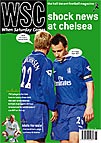 From Bolton’s bright spark to Tranmere reject and retirement aged 30, Helen Duff charts the downward spiral of a footballer who wanted to make love not war
From Bolton’s bright spark to Tranmere reject and retirement aged 30, Helen Duff charts the downward spiral of a footballer who wanted to make love not war
Hope and disappointment were the competing themes of Sasa Curcic’s football career, but in the end the latter won decisively. By the time the Yugoslavia midfielder opted for early retirement two years ago, he had convinced football fans across a broad span of the planet that he was one part virtuoso to two parts woeful lummox. Remembered with fondness for his ludicrous comments, he’s still reviled by those supporters who once saw him as a saviour and remains, in at least two English boroughs, the man least likely to be invited back to switch on the Christmas lights.
Curcic first appeared on these shores in 1995, signed by Bolton’s managerial team Colin Todd and Roy McFarland in a bid to help newly promoted Wanderers retain their Premiership status. The plan failed but, by the time the team had been clouted back downstairs, 24-year-old Curcic was being hailed as the gleam in a dark season. Praised for his assists and selfless teamwork, his surging sorties and sinuous technique made him the greatest thriller at Burnden Park since the iconic Frank Worthington.
Bolton’s formation had been shuffled to allow Curcic a free-running role in midfield and, after he scored twice in an FA Cup win over Bradford, chastened Bantams boss Chris Kamara described him as “a Serbian George Best” – a comparison all the more flattering since, in terms of facial resemblance, Sasa was more a Serbian Jack Charlton.
Less than a week before the 1996 season began, Todd was assuring Bolton fans that Curcic would be with them for the promotion fight ahead. Behind the scenes the player was fidgety, though, and – citing the need to get top-flight starts in order to keep his place in the Yugoslavia squad – he did a midnight flit to Brian Little’s Aston Villa for £4 million, over twice what Wanderers had paid for him ten months earlier.
Profit provided little consolation to the outraged Bolton fans wondering how to get CURCIC off the back of their new shirts. But within months it was the Whites left laughing as Sasa floundered in the cruel wide world.
Initially he looked destined to thrive at Villa Park. But a combination of factors – a personality clash with his manager, poor displays and a sense he had too readily adopted the role of petulant misfit – found him sidelined. After five months in Birmingham, he put in a transfer request and although he later withdrew it (staying for another inglorious year) by 1998 the club was happy to offload him to Crystal Palace for just £1m – the sort of catastrophic depreciation of investment normally reserved for stock-market crashes.
While still at Villa, Curcic fell out with his national coach – exiled from the Yugoslavia team, he now called quitting Bolton “the worst decision I have made in my life”. Such pointless candour became one of his motifs – his all-time daftest comments include a stated desire to be paid in beautiful women and (his parting shot as he quit the game): “I have given up football because of sex. I would rather score in bed than on the pitch.”
At Selhurst Park, he’s recalled less for scoring anywhere than for the cosmetic surgery he underwent to curtail his epic, meandering nose and for his foray into international politics. His time with Palace coincided with NATO’s bombing of Serbia and, when his father was nearly killed in one air raid, Curcic Junior withdrew his services in protest – instead parading round the pitch with anti-violence placards and staging demonstrations outside Downing Street.
After his second Premiership relegation, with the Eagles, Curcic did national service, followed by a brief stint with the New York/New Jersey MetroStars and a zestless spell at Motherwell. In 2000, after a failed trial with Tranmere, Curcic signed for Obilic Belgrade and traipsed back to the city he’d been playing in when Bolton promised him the big time five years earlier.
The interim period had seem him become both Wanderers’ and Villa’s record signing, amass £6.5m in transfer deals, foster and then scupper the ambition of managers and fans, and so fail to prosper at every club he tried that he retired before he was 30: his hope, like everyone else’s, long since deflated into anticlimax, bewilderment and disappointment.
From WSC 198 August 2003. What was happening this month